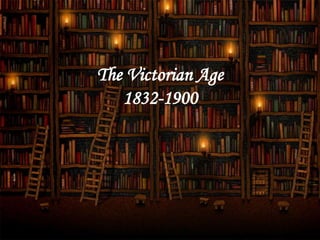
English Literature.ppt
- 2. Great Exhibition of 1851-Prince Albert-housed in the Crystal Palace (made of glass and iron) exhibited from machines to steamboat engines –prosperity, technological evolution The Victorian Age
- 3. • Scientific and technical innovations of the Industrial Revolution • European colonization of much of Africa, the Middle East, and the Far East changed most of Europe • London becomes most important city in Europe • Population of London expands from two million to six million The Victorian Age
- 4. The Growth of the British Empire • England grew to become an empire that included Canada, Australia, New Zealand, Hong Kong, Singapore, South Africa, Kenya, and India “The sun never sets on the British Empire.” • Imported raw materials such as cotton and silk and exported finished goods to countries around the world • By the mid-1800s, England was the primary manufacturer of goods and the wealthiest country in the world
- 5. • She had the longest reign in British history. Became queen at the age of 18. After her husband died in 1861, she sank into a deep depression and wore black every day for the rest of her life • Her reign lasted over 63 years, the longest of any British monarch until now. Like Elizabeth I, she gave her name to this period of British history and literature. • The telegraph, telephone, photography (Victoria was the first royal to have her portrait “taken” rather than “painted”) the advent of the automobile and electric lighting changed not only the way people lived, but their view of the world in which they lived. Queen Victoria (1819-1901) Reign: 1837-1901
- 6. —Women were to marry and provide homes. A working class woman, if married, could be a servant and if unmarried, a teacher or governess.
- 7. However… ― The Victorian concept of smog, called “the storm cloud of the 19th century.” John Ruskin describes “. . .the sky is covered with greasy cloud; now raincloud, but a dry black veil, which not ring or sunshine can pierce; …It looks partly as if it were made of poisonous smoke.” ― Social classes did not mix, appearance was very important ― Population doubled creating a demand for housing, food and clothing, increased urban poverty
- 9. English Literature • Emily Bronte: Wuthering Heights • Charlotte Bronte: Jane Eyre Charlotte Bronte
- 10. English Literature • Charles Dickens: Many of his novels were published in serial form. His comic and sentimental descriptions of the lives of people in diverse occupations and social classes made Dickens the most popular Victorian novelist. • A Christmas Carol, Great Expectations, David Copperfield • In his novels, Charles Dickens attacked the glitter as well as the poverty and cruel conditions of those like the orphan Oliver Twist.
- 11. Do you think we can relate modern issues to the Victorian era? Can you find some similarities and differences?
- 12. Why do you think so many Victorian novels have been made into modern films or TV series? (e.g. Jane Eyre, Wuthering Heights, Oliver Twist)